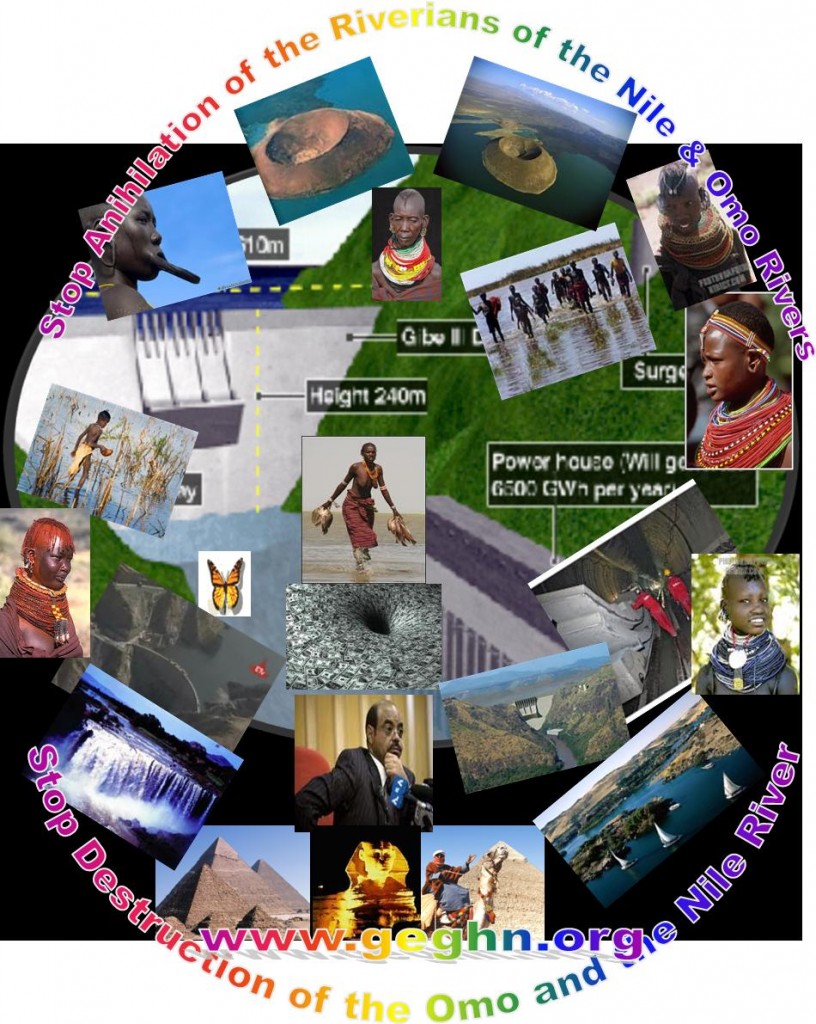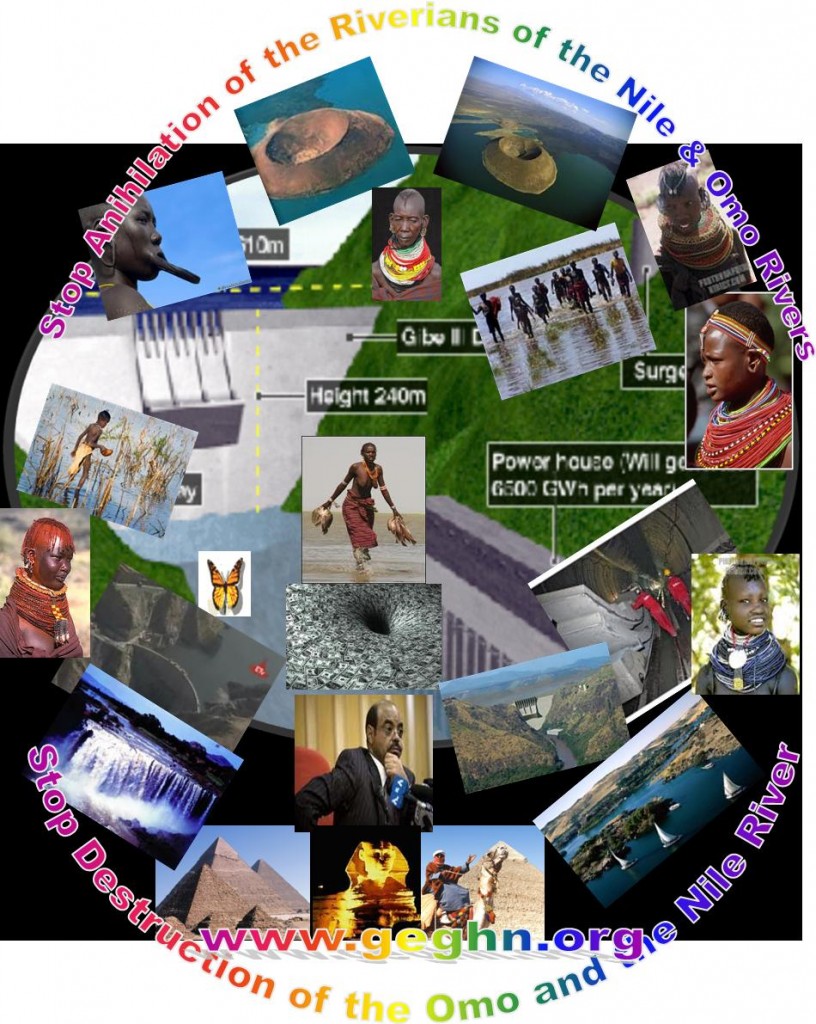Warning: Attempt to read property "ID" on null in /home/geghna/ethiopianism.net/wp-includes/media.php on line 3125
Notice: Function map_meta_cap was called incorrectly. When checking for the
read_post capability, you must always check it against a specific post. Please see Debugging in WordPress for more information. (This message was added in version 6.1.0.) in /home/geghna/ethiopianism.net/wp-includes/functions.php on line 6121

The Ethiopian Pharaoh, the shameless Melese Zenawie announced publically he will continue to pursue the building of the death dam on the river Omo and on the source of the Blue Nile. He called the people riparians as Butterflies to be eliminated. This is his official defiant declaration even after the African Development Bank and the European Bank blocked his megalomaniac dreams of water power financing at the expense of the people of Egypt, Southern Ethiopia and Kenya. His Dam on omo river will obliged the Kenyans to use the rest of the rivers that otherwise would have streamed to Egypt in their land, since Lake Turkana soon will dry immidately after the finishing of the Gebe III.
Dictator’s raged victory of the election of 23 May 2010, with dumped result of over 99% of the vote was a mock to all democracy loving nations. He publically insulted the US dam and that of the Survival international in the video here in Amharic below. He staged a demonstration in Washington DC to force the US government to change position against Egypt and support his megalomaniac damming projects over the Nile head waters. Melese the Sick Man of the Horn of Africa does not care for any environment destruction of the Ethiopian water basin. Melese to our surprise and that of the whole world was elected to represent the African continent on the international meetings where he produced a shameful result.
Melese Zenewie the Genocidal- Megalomaniac-Raciest-Mad Man must be halted before he destroys the region by war and unprecedented conflict through environmental cataclysm. This could be done by collective intervention supported by the UN. The UN Security Council must consider this sick man in power seriously than any eventual atomic treat in any part of the world. Since he actively produces destruction by proxy terrorism in Somalia, damming in most radical and expedient manor, by financing his way to power through famine and keep perpetuating the death of millions through endemic hunger.
[slideshow id=1]

PM Meles – Whether You Like It Or Not Ethiopia will build Gibe III!
[media id=179 width=320 height=240]

European Investment Bank abandons Ethiopia mega dam5 August 2010
The European Investment Bank (EIB) has announced it is no longer considering funding Africa’s tallest dam, in Ethiopia. The hydroelectric dam, called Gibe III, has drawn international criticism because of the devastating effect it is likely to have on the food security of at least eight Ethiopian tribes.
In a statement, the EIB claims to have withdrawn from Gibe III because the Ethiopian government has found alternative funding sources for the dam. However the ICBC, the state-owned Chinese bank recently discussed as a potential funder, recently made it clear that the deal is not yet settled and far from guaranteed.
Before stepping back from Gibe III, the EIB completed a review of existing environment and social impact studies for the dam. The review confirms concerns from Survival and others that the lives of the tribes living in the Lower Omo Valley, downstream of Gibe III, will be fundamentally altered and their food security threatened if the dam is complete. The study also acknowledges that these tribes have not been adequately consulted.
The Lower Omo River in south west Ethiopia is home to eight different tribes whose population is about 200,000. They have lived there for centuries.
However the future of these tribes lies in the balance. A massive hydro-electric dam, Gibe III, is under construction on the Omo. When completed it will destroy a fragile environment and the livelihoods of the tribes, which are closely linked to the river and its annual flood.
 |
| Hamar girls display their ornate hair and adornments. © Eric Lafforgue/Survival |
Salini Costruttori, an Italian company, started construction work on the Gibe III dam at the end of 2006, and has already built a third of it.
China’s largest bank, the Industrial and Commercial Bank of China (ICBC), has agreed to fund part of the construction of the dam. The Ethiopian government has also asked the African Development Bank and the Italian government to fund Gibe III, and they are expected to make a decision soon.
Survival and various regional and international organisations believe that the Gibe IIIDam will have catastrophic consequences for the tribes of the Omo River, who already live close to the margins of life in this dry and challenging area.
We are calling on the African Development Bank and other potential funders not to support this project until a complete and independent social and environmental impact study is carried out and the tribal peoples have been fully consulted and given their free informed and prior consent.
Related Articles
A Must Gibe III, the biggest hydro-electric dam
European Investment Bank abandons Ethiopia mega dam
5 AUGUST 2010
Web campaign against Ethiopia Gibe III dam « Afrika Speaks …
![]() Download a letter from Survival to the African Development Bank’sexecutive directors (PDF)
Download a letter from Survival to the African Development Bank’sexecutive directors (PDF)
![]() Read NGO International Rivers’ request for investigation of Gibe 3 dam to the Compliance Review Mechanism Unit of the African Development Bank »
Read NGO International Rivers’ request for investigation of Gibe 3 dam to the Compliance Review Mechanism Unit of the African Development Bank »
Download International Rivers Factsheet (PDF)
Protest targets Italian government over Ethiopian dam disaster
Act now to help the Omo Valley tribes
- Write a letter to the Prime Minister of Ethiopia urging him to reconsider the project.
- Donate to Survival’s campaign for the Omo Valley Tribes and other campaigns.
- Sign the petition to stop the Gibe III dam.
Mubarak pledges to keep Nile water in Egypt
While inaugurating the new Saft el-Laban corridor in Giza, President Mubarak assured that Nile water “will not extend beyond Egyptian borders.”
Mubarak further called for making optimal use of Nile water, carrying out seawater desalination projects, and using modern technology to develop new types of crops that can be irrigated with salt water in order to satisfy the growing demand for food.
Diaa Eddin al-Qoussi, former advisor to the minister of irrigation, told Al-Masry Al-Youm that Mubarak’s statements clearly demonstrate that Egypt will not give up its Nile water quota in order to satisfy Israel. He added that Mubarak’s statements further emphasize that Egypt rejects any negotiations which aim to bring Nile water to Israel.
Maghawri Shehata Diab, former president of Minufiya University and a water expert, said Mubarak’s statements reflect a clear understanding of the geographical nature of the Nile Basin, as well as of the political and legal dimensions governing the distribution of water.
In related news, Kenya has announced that it is carrying out an assessment of the impact of Ethiopia’s Gibe III Dam. The dam, intended to generate hydroelectric power, would become the second largest dam in Africa after Egypt’s High Dam in Aswan.
The massive dam is scheduled to be completed by 2012 at an estimated cost of US$1.76 billion. Construction of the dam is mainly financed by the African Development Bank. The World Bank withdrew funding for the project under pressure from non-governmental organizations.
The dam will generate 1,800 megawatts of electricity, according to the Ethiopian government, which also says that Kenya has pledged to purchase some of the energy produced by the dam. As a result, Kenyan environmental groups have accused their government of taking greater interest in the well-being of Ethiopians.
The Ethiopian government says that environmental impact studies have shown that the dam will not negatively impact life in any local communities.
The Kenyan Minister of Power said that the Kenyan government and the European Investment Bank will both study the impact of the dam. The results of both studies will be submitted to the Kenyan government in December.
The Kenyan government’s decision to examine the potential impact of building the dam came in response to local and international pressure from rights groups. These groups cited Egypt’s threat of military intervention if Ethiopia carried out any projects that would intervene with the flow of the Blue Nile.
Translated from the Arabic Edition.
Ethiopian dam ‘funded by Italy,’ say govt sources
Officials: Egypt and Uganda discuss Nile summit
Sudan ambassador: No dispute with Egypt
